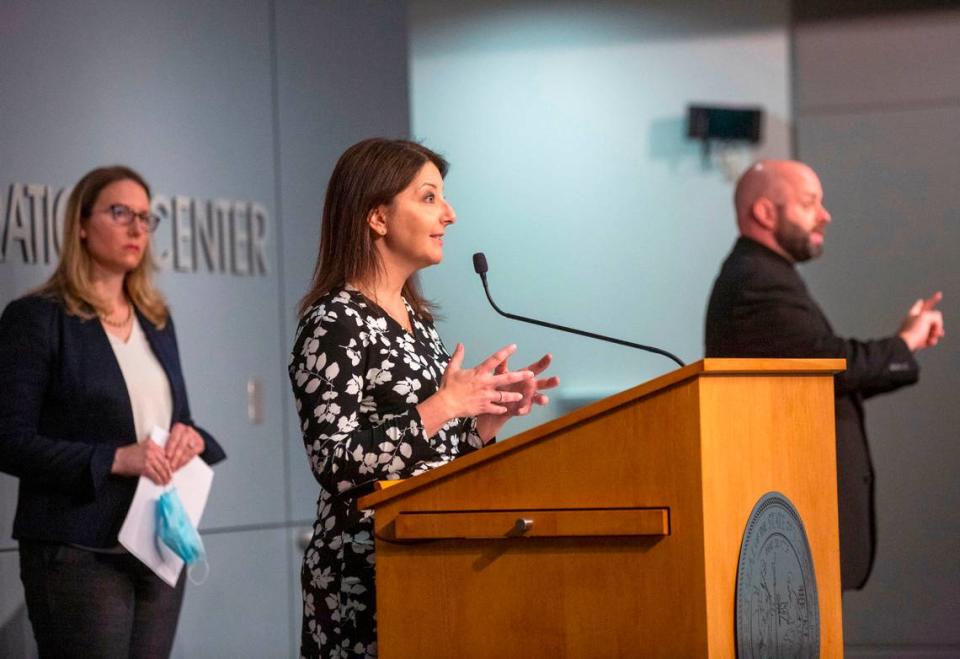A new bill in NC would reopen bowling alleys and skating rinks
A group of lawmakers in North Carolina wants to reopen bowling alleys and skating rinks ahead of the phased reopening plan set forth by Democratic Gov. Roy Cooper.
North Carolina Republicans have pushed legislation attempting to reopen first bars, then gyms, as Cooper has moved slower in reopening the state’s economy than some of them would like.
The latest proposal could go to the floor of the state House as early as Tuesday. A House committee approved it Monday. In addition to bowling and skating facilities, the bill would also allow restaurants at minor league ballparks to open.
Rep. John Szoka, a Fayetteville Republican, said small business owners in his home county of Cumberland are distraught and worried about going bankrupt if they don’t reopen soon.
Szoka said the bill is not meant to be an assault on Cooper’s authority, but rather a response to the economic fallout from businesses being closed because of COVID-19, the illness caused by the coronavirus.
Szoka also questioned the recommendations from N.C. Department of Health and Human Services Secretary Dr. Mandy Cohen.
The state is currently in Phase 2 of easing restrictions, and Cooper said Monday that he would announce at the beginning of next week if the next phase would still begin June 26 as previously scheduled.
To bring the reopening bill forward after deadlines to introduce legislation have passed, lawmakers gutted SB 599, an unrelated bill titled “State and Local Disability Benefit Reform,” and replaced its contents with their proposal to allow skating rinks and bowling alleys to open and resume operations, with conditions.
It would temporarily allow food and beverage establishments within minor league baseball stadiums to have outdoor seating of up to 10% of the stadium’s permanent seating capacity, also with conditions.
Debate over balance of health, economy
Rep. Gale Adcock, a Cary Democrat and nurse practitioner, questioned how roller skaters would be able to distance at least six feet. Szoka conceded they could not, but compared it to the lack of at least 6 feet of distancing being followed at businesses like Lowe’s, Walmart and grocery stores.
Szoka noted that the majority of deaths from COVID-19 in North Carolina have been in nursing homes and senior living facilities. He said in his judgment, it’s best to look at the economic fallout in addition to health concerns. He also questioned some of the guidance from Cohen and Dr. Anthony Fauci, director of the National Institute of Allergy and Infectious Diseases.
“I frankly don’t know whom to believe in the medical community and I’m not sure we should put the medical community in charge of our economy,” Szoka said.
Other Republicans stressed the economy, including Rep. Jimmy Dixon of Duplin County.
“We’d better start addressing the economic health of this state,” Dixon said during the committee debate.
“In my opinion we’re all going to get [COVID-19], and the sooner we get it the better off we are,” Dixon said, referring to reaching herd immunity.
House Minority Leader Darren Jackson, a Wake County Democrat, disagreed, saying he would not want the resulting number of deaths if many more people contracted COVID-19. He said he would have listened if Szoka brought in a health expert to argue the merits of the bill, which did not happen.
Jackson said that he and Szoka disagree on the health risks, not economic risks.
Szoka said he doesn’t want to intentionally put anyone in harm’s way. He said he chose bowling alleys and skating rinks for this bill because he wants to encourage Cooper to reopen more of the economy.
“I don’t think there’s anyone in the [legislative] building that’s thinking, ‘Man I’d love to crash the economy,’” Rep. Robert Reives, a Goldston Democrat, said.
“I really don’t believe the people at DHHS are just pulling this out of their behinds,” he said.
Reives said they all know the virus is spreading. “I’m glad everybody else is cavalier about it,” he said. “I don’t want to catch it.”
“I don’t think we ought to go down a route that because we’ve been elected to something we know more than a medical professional,” Reives said.
Dixon said that economic health is vital for public health.
“This virus is absolutely serious. However this is not the only serious thing that this nation has ever faced, nor will it be the last thing this nation ever faces,” Dixon said.
For more North Carolina government and politics news, listen to the Domecast politics podcast from The News & Observer and the NC Insider. You can find it on Megaphone, Apple Podcasts, iHeartRadio, Stitcher or wherever you get your podcasts.


